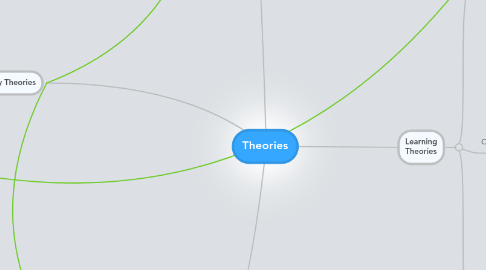
1. Technology Theories
1.1. Media Ecology
1.1.1. maintains the idea that humans are affected by the technology around us and that we use. technology has a leading role in how we operate.
1.1.2. extremely hard to define as there is not one single definition
1.1.3. study of media as environments
1.1.4. tries to find out what role media forces humans to play and how technology affects/influences society
1.2. SCOT
1.2.1. Social Construction of Technology
1.2.2. sees technology as being affected by humans
1.2.3. has a formal process to follow when someone is trying to analyze the success or failure of a certain technology
1.2.4. draws on work done in a constructivist school
1.2.5. success or failure of a technology is determined by society
2. TPACK
2.1. Technological Pedagogical Content Knowledge
2.2. function is to link the different kinds of knowledge together and then assist teachers in integrating technology into their teaching
2.3. also emphasizes the new types of knowledge that are found in the links between T, P and C
2.4. True technology integration is understanding and negotiating the relationships between these three components of knowledge
2.5. not a new idea, but is starting to gain popularity among researchers
2.6. not owned by anyone
3. Philosophy of Teachnology
3.1. it is important that students are taught literacy skills because they allow them to retain, analyze and produce content relevant to any kind of situation
3.2. scaffolded pedagogical style of teaching is required to develop inherent capabilities
3.3. learning environments are changed dramatically when students expand literacy through technology
3.4. many people have access to technology but are not proficient in the use of it
3.5. can result in teamwork and the collaboration of knowledge
4. Learning Theories
4.1. Constructivist
4.1.1. human learning is constructed, new things are learned by building on old knowledge
4.1.2. learning is active, not passive (construction, not receoption)
4.1.3. emphasizes challenging problems that will include the entire learning community
4.1.4. learners are responsible for their own learning, and everyone brings their own experiences
4.1.5. teacher is not a lecturer, but rather a facilitator
4.2. Cognitive Load
4.2.1. we all have a working memory and a long term memory
4.2.2. working memory can become overwhelmed with too much information, but long term memory is basically unlimited and supports the working memory
4.2.3. data comes in and goes through our working memory where it is processed, then it is sent to the long term memory to be stored until it is needed
4.2.4. forces teachers to be conscious of the amount of new information they present to learners at one time
4.3. Connectivist
4.3.1. learning theory for the digital age
4.3.2. having the knowledge of where to find information is more important than actually knowing information
4.3.3. personal knowledge is made up of connections
4.3.4. another form of active learning, rather than passive
4.3.5. knowledge is in the world and needs to be found by people. It does not actually exist in the brains of individuals
